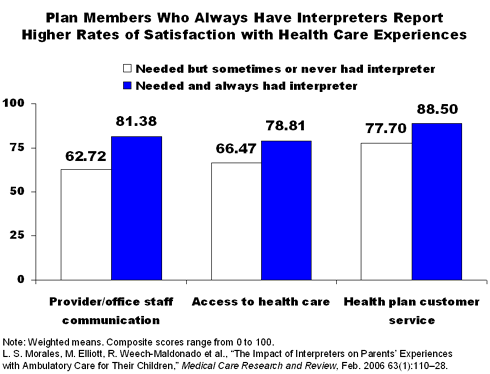In the Literature
With America's ethnic diversity increasing every year, language barriers are a growing problem for people seeking medical care. Many patients with limited English either struggle to communicate with their clinicians or turn to family members, friends, or other ad hoc interpreters—a reliance that can compromise health care experiences and health outcomes.
New research supported by The Commonwealth Fund finds that having access to medical interpreters can significantly improve patients' experiences, while substantially reducing racial and ethnic disparities. For the study, "The Impact of Interpreters on Parents' Experiences with Ambulatory Care for Their Children," (Medical Care Research and Review, February 2006), a research team led by Leo S. Morales, M.D., Ph.D., of the University of California, Los Angeles, analyzed data collected by the California State Children's Health Insurance Program (SCHIP) from 26,298 parents of children enrolled in participating health plans between 2000 and 2001. Among states, California has the highest percentage of individuals with limited English proficiency, according to the U.S. Census Bureau. There, state law requires all health insurance plans participating in SCHIP to provide trained medical interpreters to people who need them.
Interpreters, When Available, Lead to Higher Patient Satisfaction
Despite California's legal requirements, many patients needing interpreters during medical visits do not have consistent access to one. The researchers found that less than half (47%) of patients who required an interpreter during a medical visit reported they were always provided with one. Twenty-seven percent said they usually had one, and more than one-fourth (26%) said they either never had an interpreter or only sometimes had one.
When they are available, interpreters can bring patients greater satisfaction with their health care. The researchers found a strong correlation between availability of interpreters and satisfaction. Patients who need medical interpreting services but only sometimes or never receive them reported the lowest ratings on the measures of care analyzed: provider and staff communication, access to care, and health plan customer service. In contrast, those who need and always have an interpreter reported the highest ratings on these factors.
In fact, non-English speaking people who always have an interpreter during medical visits reported higher ratings than English speakers who do not need interpreters. Interpreters may enhance the health care experience, the study's authors speculate, in ways that go beyond language translation. Other research supports this explanation, finding that medical interpreters may act as "cultural brokers" or "health system way finders" for non-English speakers.
The researchers also found different patterns of interpreter use depending on the language spoken by the patient. Among Spanish speakers, 19 percent reported needing an interpreter, of whom 10 percent reported always having one. Alternatively, among Asian/Pacific Islanders, 10 percent reported needing an interpreter, of whom only 2 percent reported having one.
Interpreters Can Help Reduce Health Disparities
The authors suggest that consistently providing trained medical interpreters can substantially improve patients' experiences of care. They found that providing interpreters to plan members who need them resulted in a 9 percent improvement in the communication measure for Hispanics and a 23 percent improvement for Asian/ Pacific Islanders. Such access would go a long way toward reducing racial and ethnic disparities in experiences of care, the authors say. According to their estimates, providing optimal access to interpreters would decrease white–Hispanic disparities in reports of care by 19 percent to 28 percent and white–Asian/Pacific Islander disparities by 8 percent to 21 percent.
Conclusions
No federal law mandates that health care facilities must provide medical interpreters to patients who need them. The U.S. Department of Health and Human Services' guidelines only require that health care sites receiving federal funds make an effort to provide interpreters. Among the states, legislation addressing medical interpretation varies widely. Consequently, trained medical interpreters are not available to many patients who need them.
The authors say that to expand the use of interpreters, policies are needed to increase providers' and patients' awareness of available services; accelerate hiring of bilingual staff; and expand the use of telecommunications tools, such as the remote simultaneous interpretation system employed by the United Nations and now being adapted for use in health care settings.
Facts and Figures
- Approximately 45 million U.S. residents—about 18 percent of the population—speak a language other than English at home.
- Overall, 15 percent of health plan members in the study reported needing an interpreter in the last six months, including 7 percent who reported always having one, 4 percent who reported usually having one, and 4 percent who reported never or sometimes having one.
- Although health plans may be contractually required to provide interpreter services by a payor like SCHIP, this study suggests that members with limited English may frequently receive care without the benefit of interpreters.



